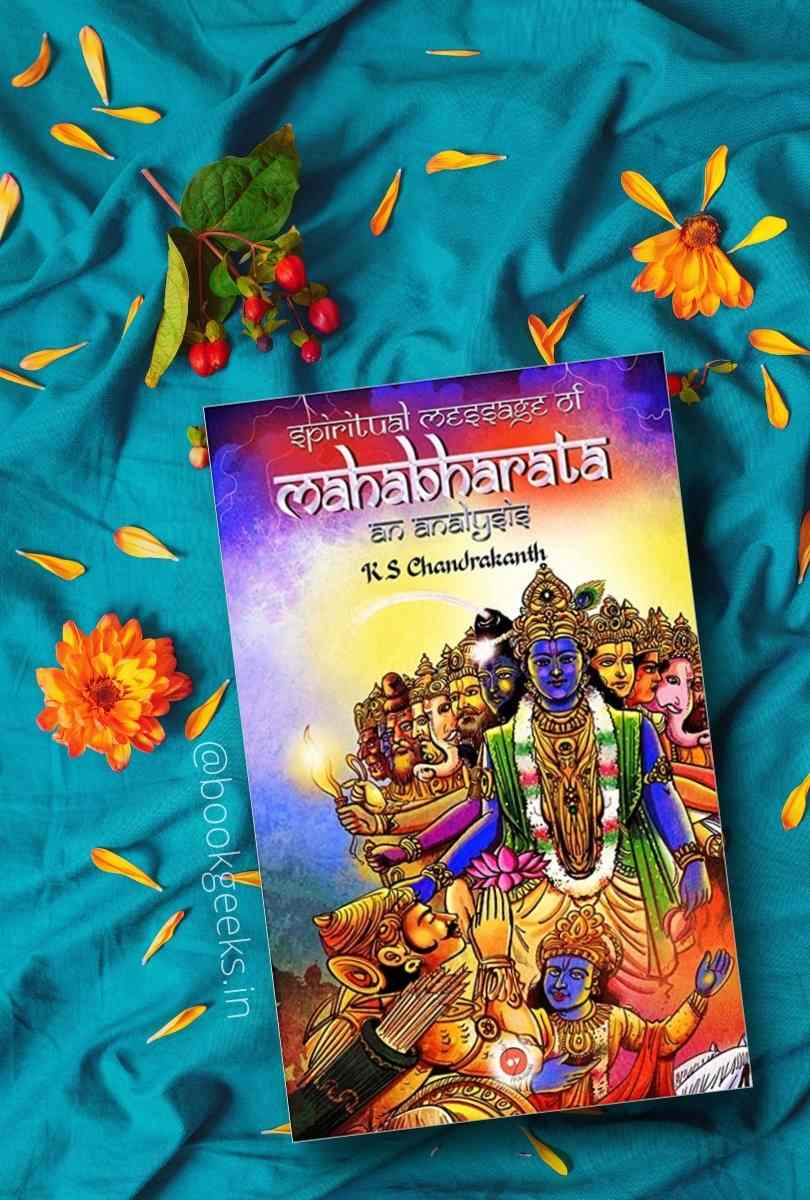CONCEPT: 4.5/5 WRITING: 4/5 OVERALL: 4/5
“The ‘ultimate’ answers to ‘ultimate’ problems of the world are not in the world, are not in trying to remove those problems from those affected, but is within our conscience.”
– KS Chandrakanth, Spiritual Message of Mahabharata
Have you ever wondered?
Have you ever wondered why the Srimad Bhagavad Gita is so revered? Why it is said to contain the essence of life?
Ever wondered how its message is still relevant to today’s time, even after thousands of years? How its stories are symbolic representations of many philosophical and spiritual concepts?
If you are a soul who is curious about the Mahabharata, the Srimad Bhagavad Gita, and the message and philosophy that they contain, then KS Chandrakanth’s Spiritual Message of Mahabharata is one book you should definitely be reading.
Who can read?
The book is meant for readers who are looking for an introductory analysis of the message of the Mahabharata. Written in a language that uses simple words and a breezy tone, it can be easily picked up by those with a working knowledge of English. That being said since most of the concepts analyze stories in the Mahabharata, prior knowledge of the epic is essential.
What to expect?
Expect a short read (under 90 pages) that attempts to teach us the essence of life while decoding the stories and chapters from the Mahabharata and the Srimad Bhagavad Gita.
Clarity of thought and execution
What I liked about the writing is the clarity with which the author has conceptualized the book and also executed it. Right at the beginning, he says that he doesn’t claim that the book is the only way to interpret the epic or even that it is the right way. Instead, he states that it is his version, his interpretation. He keeps the book short and concise, realizing and also stating that some concepts may need much more detail and time.
Juxtaposition with life
The book begins with an introduction to the Mahabharata, its stories, its many characters, and an introduction to the concept of ‘life as a journey’. The reader is then presented with the juxtaposition of life with the epic, with short sections briefly delving into the main episodes like the disrobing of Draupadi, the game of dice, etc.
Some baffling but illuminating themes
Then there are the introductions to the major characters and their philosophical significance. The author delves into some paradoxes and mysteries concealed within the epic. Personally, I found this section to be highly intriguing.
Some of these baffling themes that it talks about (I am sure many like myself would have also wondered about them) include Draupadi having five husbands, the stark difference between the number of Kauravas and Pandavas, the unnatural birth of both Kauravas and Pandavas, the blind couple – Dhritarashtra and Gandhari, etc.
Parallels with life
The book draws many parallels between the epic and life, and through this discourse, teaches us a thing or two about the journey of life, and how to live it morally, ethically, and in the best way possible. This part sees the author allegorizing Pandavas as the five senses, Draupadi as the Jiva, and Kauravas as the countless worldly objects that crave our attention.
“The epic story does not stop at pointing out the problems man faces in life, but goes on to explore and explain the root cause of these problems and also provides possible solutions to all and sundry problems.”
Important verses from the holy text
It also lists important verses from the Srimad Bhagavad Gita especially those concerned with the concepts and philosophies captured in the book, while describing in careful detail, the general guidelines for living a righteous life.
Social systems and Karma
Towards the end, we also learn about the importance of social systems like the Varna system and the Ashram system. One thing that sets this book apart is how the author clearly delineates the difference between the actual systems and their usefulness, and the corruption that has seeped into them, leading to their exploitation.
Further, it also markedly defines and explains the importance of Karma, Dharma, Swadharma, and the destination of life.
Immensely beneficial
The book, thus, delves into a wide variety of spiritual and philosophical topics that, if understood with a clear heart and open mind, will eventually benefit anyone who reads it. As for me, every page carried something novel, something extraordinary; a new lesson, a new attempt at understanding the enigma called life.
Did I find it useful?
Yes, to a large extent I did.
Will I read it again?
Yes, indeed, for the book has so much to offer and I am sure with repeated reading, I would greatly benefit from it as an individual.
Pick the book
- All the above paragraphs are enough reasons to make one pick the book up.
Skip the book
- Only if you are looking for a much more detailed read on the subject.
Can’t wait to read it? Buy your copy of Spiritual Message of Mahabharata using the link below.
